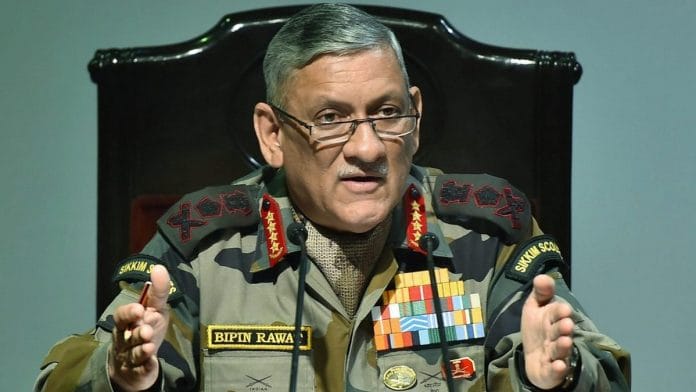Indian Army chief General Bipin Rawat was speaking at Raisina Dialogue, a conference on international policy matters, in New Delhi.
New Delhi: Indian Army chief General Bipin Rawat Wednesday backed talks with the Taliban in war-torn Afghanistan, and called for international curbs on regular and social media to counter radicalisation.
Speaking at Raisina Dialogue 2019, a multilateral conference on international policy matters, General Rawat also took a dig at Pakistan, saying terrorism was a multi-headed monster that would exist as long as nations continued to sponsor it.
On talks with the Taliban, Rawat said any dialogue with the Islamist terrorist organisation should involve no conditions. Any concessions, he added, would give the other side the notion that they were talking from a position of strength and victory.
“There should be talks with Taliban so long as they don’t come with pre-conditions and so long as they are looking at lasting peace in Afghanistan and bring about stability in that country,” he said.
“It is in our interest, region’s interest, and in Pakistan’s interest. We all want stability,” he added.
The Army chief was responding to a question on whether he was concerned about Pakistan once again finding its way into Afghanistan by facilitating discussions between the US and the Taliban.
General Rawat said Pakistan, which helped organise a dialogue between the US and the Taliban in December, was rightly aiming for a favourable situation in Afghanistan, a neighbour with which it shares an over 2,400-km border.
“Pakistan has always treated Afghanistan as its backyard. They are concerned about it and, as a military leader, I would say why not be concerned about their backyard,” he added. “They always want a situation in Afghanistan which is favourable to them. So, even if it implies speaking to the devil, they will do it.”
Other experts on the stage, like former Pakistani envoy to US Hussain Haqqani, as well as some audience members, however, wondered if the Taliban could really be trusted.
Rawat’s comments on talks with the Taliban come at a time when the Indian security forces have intensified operations in Jammu & Kashmir against terror groups, with 2018 seeing a record number of terrorist kills.
Also read: Indian Army set to push through with General Bipin Rawat’s reforms for a leaner force
‘Curbs on social, conventional media’
The General sought to warn against the increasing radicalisation of youth in Kashmir, putting much of the blame on misinformation spread through social and conventional media.
According to statistics maintained by central security agencies, 2018 saw nearly 200 local youths joining terror groups in Kashmir.
He said that, in Kashmir, the youth were getting radicalised by a “lot of misinformation, disinformation, a lot of falsehoods on religion that are being spread to them”.
“That is… why more and more educated youth are being drawn into terrorism…” he said, hinting at Pakistan’s role in the matter.
“It (state sponsoring of terror) is low-visibility, high-gain option. It is now becoming a form of warfare. We used to earlier talk about guerrilla warfare and now it’s terrorism,” he added. “Terrorism is now spreading its head like a multi-headed monster and it will continue to spread… wherever there is world wide web,” he said.
“Because radicalisation is happening through the media,” he said, “So long as the media will keep giving coverage and notice to terror activities, it will stay.”
The Army chief said the international community should come together to ensure curbs on media and social media to check radicalisation, adding that this should not be seen as a way to stifle the press.
Rawat also noted the failure of the West Asia-based terrorist outfit, Islamic State, to carve a foothold in India despite the country’s vast Muslim population.
This, he said, could be attributed to Indians’ deep love of family, adding that relatives often came together to extract kin who fell into the trap of radicalisation.
“We are a family that remains united,” he said. “One or two members of a family get radicalised… and other members of family get to know about it, there is a concern within the family and [they] try and work it out,” he added.
The Army chief also credited the intelligence agencies and the beat-policing system in India for keeping the IS’ influence at bay.
Also read: General Bipin Rawat explains why restructuring the Indian Army is his top priority
This is an updated version of the report.






